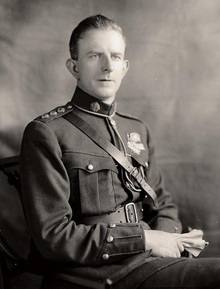Eoin O'Duffy
| Eoin O'Duffy | |
|---|---|

O'Duffy in 1922 as police commissioner.
|
|
| Teachta Dála | |
|
In office 24 May 1921 – 27 August 1923 |
|
| Constituency | Monaghan |
| Commissioner of the Garda Síochána | |
|
In office September 1922 – February 1933 |
|
| Preceded by | Michael Staines |
| Succeeded by | Eamon Broy |
| Personal details | |
| Born |
20 October 1892 Lough Egish, Monaghan, Ireland |
| Died | 30 November 1944 (aged 52) Dublin, Ireland |
| Nationality | Irish |
| Political party |
Sinn Féin (1917–23) Fine Gael (1933–34) National Corporate Party (1935–37) |
| Religion | Roman Catholicism |
| Military service | |
| Allegiance |
Irish Volunteers Irish Republican Brotherhood Irish Republican Army National Army Irish Brigade |
| Years of service | 1917–1933 1936–1937 |
| Rank |
General Chief of Staff |
| Battles/wars |
Easter Rising Irish War of Independence Irish Civil War Spanish Civil War |
Eoin O'Duffy (Irish: Eoin Ó Dubhthaigh; 30 October 1892 – 30 November 1944) was an Irish political activist, soldier and police commissioner. O'Duffy was the leader of the Monaghan Brigade of the Irish Republican Army (IRA) during the Irish War of Independence and in this capacity became Chief of Staff of the IRA in 1922. He was one of the Irish activists who along with Michael Collins accepted the Anglo-Irish Treaty and fought as a general in the Irish Civil War on the pro-Treaty side.
Professionally, O'Duffy became the second Commissioner of the Garda Síochána, the police force of the new Irish Free State, after the Civic Guard Mutiny and the subsequent resignation of Michael Staines. In his political life O'Duffy had been an early member of Sinn Féin, founded by Arthur Griffith. He was elected as a Teachta Dála (TD) for his home county of Monaghan during the 1921 election. After a split in 1923 he became associated with Cumann na nGaedheal and led the organisation known as the Army Comrades Association (Blueshirts). After the merger of various pro-Treaty factions under the banner of Fine Gael, O'Duffy was the party leader for a short time.
An anti-communist, O'Duffy was attracted to the various authoritarian nationalist movements on the Continent. He raised the Irish Brigade to fight for Francisco Franco during the Spanish Civil War as an act of Catholic solidarity and was inspired by Benito Mussolini's Italy to found the National Corporate Party. He offered to Nazi Germany the prospect of raising an Irish Brigade to fight in Operation Barbarossa during World War II on the Eastern Front against the Soviet Union, but this was not taken up.
...
Wikipedia
